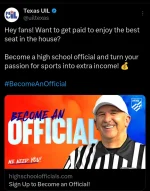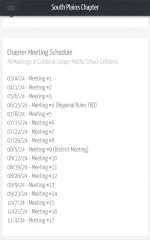Happy New Year to everyone in our Six-man community. We are about 8 months away from the start of 2 a days. I know, why am I bringing up 2 a days in January?? It's the start of a new year, and the need for more zebras on the field is ever growing across the state. The average age of a zebra on the field is above 50 years, so the need for younger zebras is starting to add up with older zebras stepping into retirement. I am greatly appreciative of these older zebras because they worked my games in J.H. & H.S. and have helped me make the transition to being a zebra on the field. As most fans have noticed across the state, especially in six-man, the moving of games to different days to accommodate for the shortage of zebras to work games from junior high to varsity.
The preseason has begun and zebras across the state have started preparing for the upcoming season with the hopes of working a playoff game and ultimately working a state championship game in December. Film study, goal setting, zebra mentoring, rule book reading and application are becoming a weekly priority because before we know it, the season will be here. T.A.S.O. (Texas Association of Sports Officials) provides great videos of instruction from accomplished officials (H.S. and College) during the preseason that would help a rookie to a seasoned veteran get ready for the season. A very experienced official with dozens of playoff games once told me "If you wait until May, June, July, or August to prepare for the season, you have already missed the season".
This is an opportunity to positively impact your community, area schools, and the great game we all enjoy at any level. I will put a link below of chapter locations across the state. Click on one closest to you and you will find the email of leaders of those chapters. They will put you in the right direction to prepare for the upcoming season.
TASO Chapters
The preseason has begun and zebras across the state have started preparing for the upcoming season with the hopes of working a playoff game and ultimately working a state championship game in December. Film study, goal setting, zebra mentoring, rule book reading and application are becoming a weekly priority because before we know it, the season will be here. T.A.S.O. (Texas Association of Sports Officials) provides great videos of instruction from accomplished officials (H.S. and College) during the preseason that would help a rookie to a seasoned veteran get ready for the season. A very experienced official with dozens of playoff games once told me "If you wait until May, June, July, or August to prepare for the season, you have already missed the season".
This is an opportunity to positively impact your community, area schools, and the great game we all enjoy at any level. I will put a link below of chapter locations across the state. Click on one closest to you and you will find the email of leaders of those chapters. They will put you in the right direction to prepare for the upcoming season.
TASO Chapters



